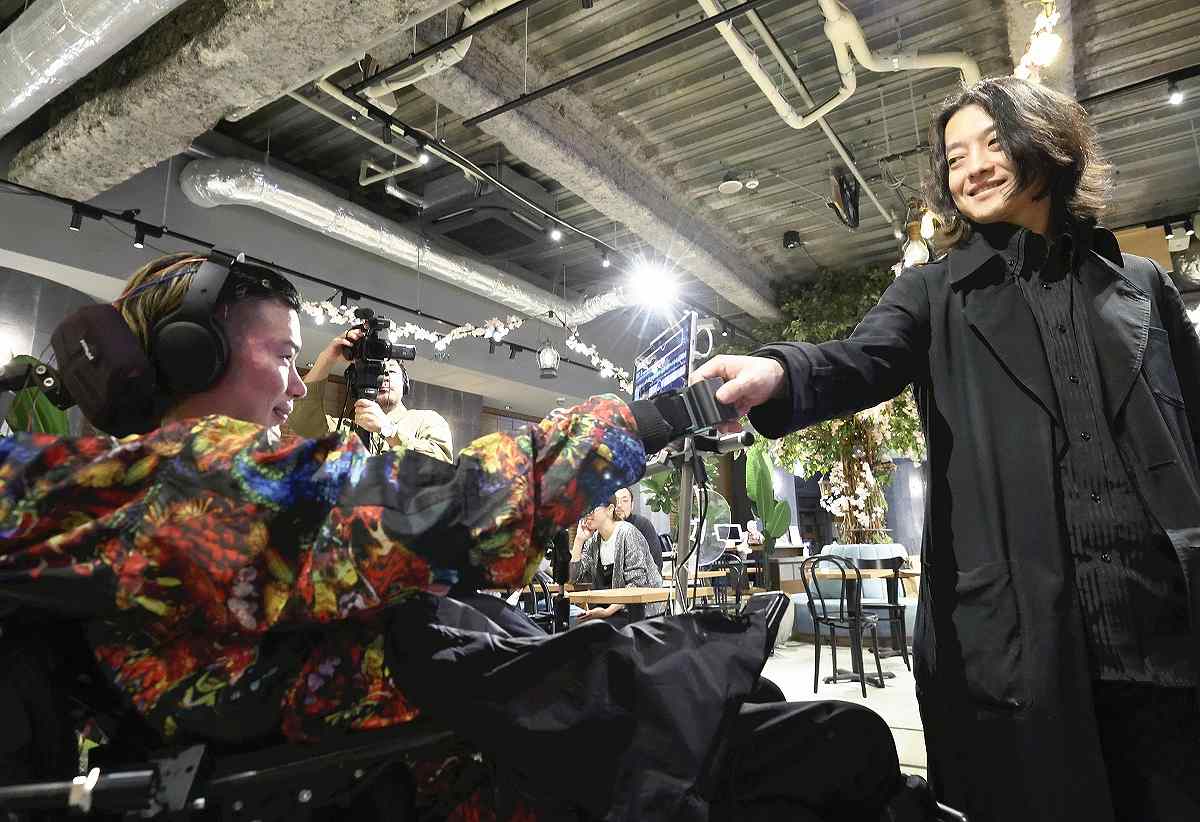Japan 2050: Changing Lifestyles / Beyond the Limit: Tokyo Researchers Develop Tech to Break Bodily, Perceptual Barriers

ALS patient Masatane Muto, left, shakes hands with Ory Yoshifuji by moving a robotic arm with his brain waves in Tokyo.
The Yomiuri Shimbun
6:00 JST, July 1, 2024
This is the second installment in a series that explores what Japan will look like in 2050, how we as a nation will meet the challenges and what kind of society we want to have.
***
“Let’s shake hands.” In mid-April, a test was conducted in Tokyo to move a robotic arm using brain waves. Masatane Muto, a patient with amyotrophic lateral sclerosis (ALS), was the test’s subject. After announcing the handshake, he closed his eyes.
As he focused his attention for about 30 seconds, 10 devices attached to his head and ears captured his brain wave activity. Then, a robotic arm attached at his shoulder moved slowly and shook the hand of Ory Yoshifuji, 36, a robotics researcher.
“That’s good,” someone said. “Perfect!” said another. Muto responded to their cheers with a smile. “It moved on my command, my active arm,” he said.
Muto developed ALS 11 years ago. His muscles atrophied all over his body and became unable to speak after having a tracheotomy. “Technology not only supplements my physical functions, but also expands them and broadens the scope of my activities,” he says.
To speak, he types in what he wants to say via a system that tracks his eye movements and his words come out in a computerized voice. He makes music digitally and participates in overseas events online with his avatar.
In autumn last year, his daughter was born via in vitro fertilization. Muto, says the success of the robotic arm experiment gives him a lot of hope: “Even if my disease advances, I can still reach out and touch my wife and daughter. My hope for the future has grown stronger.”
“It should eventually be possible for people to go outside by operating an electric wheelchair with their brain waves” Yoshifuji said.
“Human augmentation,” the technology to expand physical and perceptual capabilities using robotics, as well as information and communication technology, has been drawing attention as a way to help people lead lives the way they want to.
Through human augmentation, researchers are attempting to use robotics and information and communications technology to expand physical and perceptual capabilities. The concept is drawing attention as a way to help people lead decent lives.
The Moonshot Research and Development Program, which was launched by the Cabinet Office in 2020, calls for a society free from “limitations of the body, brain, space and time” as one of 10 goals to be realized by 2050.
In a future with advanced human augmentation, it could be the norm for a bedridden individual to remotely control a robot, and for an individual and their digital avatar to simultaneously work at different locations.
“Everyone will have another body and be able to lead a fulfilling life in their own way,” said Prof. Kouta Minamisawa of Keio University, who is involved in the development of technology to remotely share the sense of touch.
The Vision Pro headset, released by Apple Inc. in the United States in February, may also become a tool that helps individuals expand their range of activity and their roles and that helps solves the problems that come with a shrinking population.
The device is what is known as a spatial computer and is operated by eye and hand movements. When worn, the user’s current space and the virtual world merge, making it possible to easily perform multiple tasks simultaneously, such as participating in a meeting online while cooking in real life. It is also possible to enjoy simulated space travel by superimposing a view of the moon’s surface on a room. The Vision Pro went on sale in Japan in late June.
“It’ll be possible to concentrate on what you really want to do by omitting many things and activities,” said Nobuhiko Watanabe, a professor at the Graduate School of Project Design and the chief operating officer at Styly, Inc, a Tokyo-based IT firm. “The hours in a day and your life, which you only live once, will become incomparably denser compared to today.”
Technology is on a steady march toward the future. But many issues will have to be resolved before new technologies can be put to use, including ethical issues and the establishment of relevant laws.
“Tech innovations could make up for labor shortages that come with a shrinking population,” said Atsuya Fujimoto of Mitsubishi Research Institute, Inc. “What is most important is how individuals will act and what they are trying to achieve. It’s their ability to envision the future they want.”
Most Read
Popular articles in the past 24 hours
-

Japan’s Lotteria Restaurant Operator Co. Changes Name, Will Rebra...
-

Revitalization of Shipbuilding Industry: Counter Chinese, S. Kore...
-

University of Tsukuba Faculty Member Posts Discriminatory Message...
-

Japan's Foreign Minister Says No Contact With China's Counterpart...
-

Osaka Expo Mascot Myaku-Myaku-Themed Cafe Opens in Osaka, Set to ...
-

Japanese Shares Dip as Soft Data, Post-Election Lull Cap Moves
-

Milano Cortina 2026: 500-Meter Bronze Gives Miho Takagi Drive For...
-

1st Overseas Suke-San Udon to Open in Taiwan; Company Aims for Mo...
Popular articles in the past week
-

Prudential Life Insurance Plans to Fully Compensate for Damages C...
-

Videos Plagiarized, Reposted with False Subtitles Claiming ‘Ryuky...
-

Woman with No Overseas Travel History Infected with Measles in Na...
-

Milano Cortina 2026: Kokomo Murase Comes Out on Top After Overcom...
-

CRA Leadership Election Will Center on Party Rebuilding; Lower Ho...
-

Tokyo’s New Record-Breaking Fountain Named ‘Tokyo Aqua Symphony’
-

Crime in Japan Ticks Up for 4th Straight Year
-

Japanese Constitutional Revision Debate Expected to be Revived Af...
Popular articles in the past month
-

Japan Institute to Use Domestic Commercial Optical Lattice Clock ...
-

Israeli Ambassador to Japan Speaks about Japan’s Role in the Reco...
-

Man Infected with Measles May Have Come in Contact with Many Peop...
-

China Eyes Rare Earth Foothold in Malaysia to Maintain Dominance,...
-

Prudential Life Insurance Plans to Fully Compensate for Damages C...
-

Woman with Measles Visited Hospital in Tokyo Multiple Times Befor...
-

Australian Woman Dies After Mishap on Ski Lift in Nagano Prefectu...
-

Foreign Snowboarder in Serious Condition After Hanging in Midair ...
Top Articles in Society
-

Man Infected with Measles May Have Come in Contact with Many People in Tokyo, Went to Store, Restaurant Around When Symptoms Emerged
-

Woman with Measles Visited Hospital in Tokyo Multiple Times Before Being Diagnosed with Disease
-

Australian Woman Dies After Mishap on Ski Lift in Nagano Prefecture
-

Foreign Snowboarder in Serious Condition After Hanging in Midair from Chairlift in Nagano Prefecture
-

Record-Breaking Snow Cripples Public Transport in Hokkaido; 7,000 People Stay Overnight at New Chitose Airport
JN ACCESS RANKING
-

Japan Institute to Use Domestic Commercial Optical Lattice Clock to Set Japan Standard Time
-

Israeli Ambassador to Japan Speaks about Japan’s Role in the Reconstruction of Gaza
-

Man Infected with Measles May Have Come in Contact with Many People in Tokyo, Went to Store, Restaurant Around When Symptoms Emerged
-

Prudential Life Insurance Plans to Fully Compensate for Damages Caused by Fraudulent Actions Without Waiting for Third-Party Committee Review
-

Woman with Measles Visited Hospital in Tokyo Multiple Times Before Being Diagnosed with Disease







